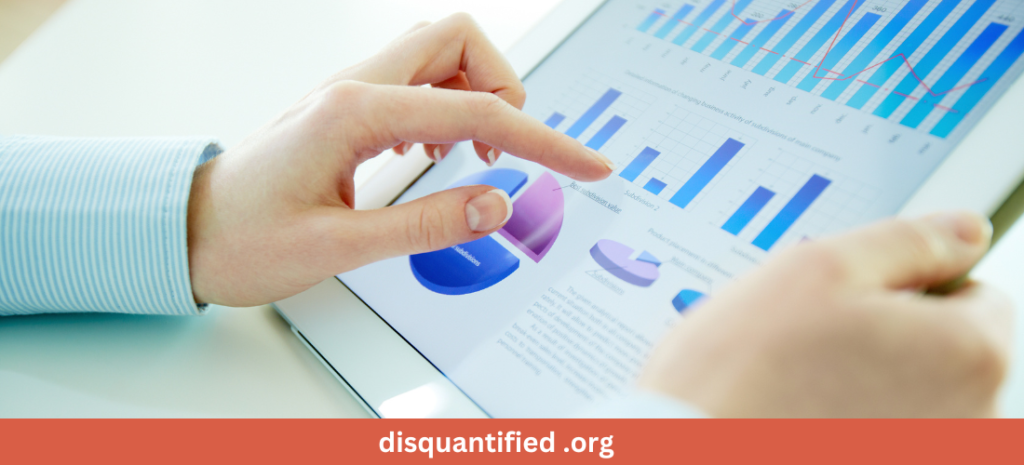In today’s world, quantification has become an integral part of our daily lives, influencing decisions in business, healthcare, education, and even personal relationships. disquantified .org From data analytics to performance metrics, numbers are increasingly driving the way we understand and interact with the world. But what happens when the emphasis on quantification begins to overshadow the qualitative aspects of human experience? This article explores the profound impact of quantification on society and the potential consequences of living in a world dominated by numbers.
The Rise of disquantified .org Quantification in Modern Society
The rise of quantification in modern society reflects an increasing reliance on numbers and metrics to understand and manage various aspects of life. disquantified .org From business and education to healthcare and social interactions, quantification offers a seemingly objective framework for making decisions, evaluating performance, and measuring progress. This shift towards a data-driven approach has been fueled by advancements in technology and the proliferation of big data, allowing for detailed analysis and tracking of a vast array of metrics. While quantification provides valuable insights and efficiency, it also risks reducing complex human experiences and nuanced issues to mere numbers, potentially overlooking the qualitative dimensions that are equally important.
The Data-Driven Age
We are living in a data-driven age where quantification has become synonymous with objectivity and accuracy. Whether in corporate settings or governmental policies, numbers are often used to justify decisions and allocate resources. The rise of big data has further fueled this trend, providing unprecedented access to vast amounts of information that can be analyzed, measured, and quantified.
However, the reliance on data and quantification can sometimes lead to an oversimplification of complex issues. Human behavior, for example, cannot always be accurately represented by numbers. The nuances of human experiences, emotions, and relationships are often lost when they are reduced to mere data points.
Quantification in Business and Economics
In the realm of business and economics, quantification plays a crucial role. Companies use metrics such as Key Performance Indicators (KPIs), return on investment (ROI), and customer satisfaction scores to gauge success and make strategic decisions. While these metrics are valuable tools for measuring performance, they can also create a narrow focus on short-term gains rather than long-term sustainability.
For instance, an overemphasis on quarterly earnings reports can pressure companies to prioritize immediate profits over investments in innovation or employee well-being. This can lead to a work culture where the pursuit of numbers trumps creativity, collaboration, and job satisfaction.
The Impact on Education
Quantification has also permeated the field of education. Standardized testing, for example, is a common method used to measure student achievement and school performance. While these tests provide a uniform measure of academic progress, they often fail to capture the full range of a student’s abilities, including critical thinking, creativity, and social skills.
The focus on test scores can lead to a narrow curriculum that prioritizes rote memorization over deep understanding. It can also create a high-pressure environment for students and teachers, where success is defined by numbers rather than the holistic development of individuals.
Read Also: feedbuzzard com
The Impact of disquantified .org on Society

In an era where data and metrics dominate every aspect of life, disquantified .org A Deep Dive into the Impact of Quantification on Society has emerged as a crucial platform challenging the societal overreliance on quantification. This website delves into the complexities of quantification, questioning its pervasive influence on decision-making, social interactions, and personal identities. By examining the nuanced implications of living in a data-driven world, Disquantified.org offers a unique perspective on the consequences of reducing human experience to numbers. This article explores the profound impact of Disquantified.org on society and the critical conversations it sparks about the role of quantification in our lives.
Challenging the Quantification Paradigm
Challenging the quantification paradigm involves critically examining the pervasive reliance on numbers and metrics to define success, value, and truth in society. While quantification offers clarity and precision, it often oversimplifies complex human experiences, reducing them to mere data points. This paradigm can overlook the nuances of individual and collective well-being, prioritizing efficiency and measurable outcomes over deeper, qualitative aspects of life. By questioning this approach, we advocate for a more balanced perspective that recognizes the limitations of numbers and embraces the richness of human experience, ensuring that decisions reflect the full spectrum of societal values and needs.
Questioning the Dominance of Numbers
Disquantified.org plays a pivotal role in challenging the dominance of numbers in shaping our understanding of the world. In a society where data and metrics are often seen as the ultimate indicators of truth, this platform offers a counter-narrative that highlights the limitations and potential dangers of quantification. By critically analyzing the ways in which numbers are used to make decisions—whether in education, healthcare, or governance—Disquantified.org encourages a more holistic approach that considers the qualitative aspects of human experience.
The platform’s content sheds light on how the overemphasis on quantification can lead to the oversimplification of complex issues. For instance, it critiques the use of standardized testing in education, which often reduces a student’s capabilities to a single score, ignoring the broader context of their skills, creativity, and emotional intelligence. By doing so, Disquantified.org advocates for a more comprehensive understanding of human potential that goes beyond mere numbers.
Promoting Ethical Considerations in Data Use
One of the significant contributions of Disquantified.org is its focus on the ethical implications of data use and quantification. In an age where big data and artificial intelligence (AI) are increasingly used to drive decisions in various sectors, the platform raises important questions about privacy, fairness, and accountability. Disquantified.org challenges the assumption that data is inherently objective and highlights how biases in data collection and analysis can perpetuate inequalities and reinforce existing power structures.
Through its articles and discussions, Disquantified.org emphasizes the need for ethical guidelines and regulatory frameworks that govern the use of data and algorithms. It calls for greater transparency in how data is collected, analyzed, and applied, advocating for the protection of individual rights and the prevention of harm in the digital age.
Influencing Public Discourse and Policy
Influencing public discourse and policy is crucial in shaping a society that is informed, equitable, and responsive to its citizens’ needs. By introducing critical perspectives and fostering open dialogue, platforms that challenge prevailing norms—such as the overreliance on data and quantification—play a key role in reshaping how issues are understood and addressed. These discussions can shift public opinion, encouraging a more nuanced view that goes beyond surface-level metrics. As these ideas gain traction, they can influence policymakers to consider broader, more inclusive approaches that prioritize human well-being, ethical considerations, and social justice, ultimately leading to more thoughtful and comprehensive policies.
Shaping Conversations About Data and Society
Disquantified.org has become a significant voice in shaping public discourse about the role of data and quantification in society. disquantified .org By providing a platform for critical reflection and debate, it has influenced how individuals, organizations, and policymakers think about the use of numbers in decision-making. The platform’s thought-provoking content has sparked conversations about the need to balance quantitative data with qualitative insights, ensuring that decisions reflect the full complexity of human experiences.
In particular, Disquantified.org has been instrumental in raising awareness about the potential risks of data-driven decision-making in governance. It highlights how an overreliance on metrics can lead to policies that prioritize efficiency over equity, potentially marginalizing vulnerable populations. By advocating for a more inclusive approach to policymaking, Disquantified.org contributes to the development of more just and equitable societal structures.
Impact on Education and Research
The impact of disquantified .org extends to the fields of education and research, where it challenges traditional methods of assessment and evaluation. The platform’s critique of standardized testing and performance metrics has resonated with educators and researchers who are seeking more holistic ways to assess learning and development. By promoting alternative approaches that value creativity, critical thinking, and emotional intelligence, Disquantified.org is helping to reshape educational practices in ways that better reflect the diverse abilities of students.
In the realm of research, Disquantified.org encourages scholars to consider the limitations of quantitative methods and to incorporate qualitative perspectives into their work. By doing so, it fosters a more balanced approach to knowledge production that recognizes the importance of context, culture, and human experience in understanding complex phenomena.
Fostering a More Human-Centered Society
Advocating for a Balance Between Quantitative and Qualitative Insights
At its core, disquantified .org advocates for a society that values both quantitative and qualitative insights. It calls for a more nuanced understanding of human behavior and societal issues, one that recognizes the limitations of relying solely on numbers. By promoting a balanced approach, the platform encourages decision-makers to consider the broader implications of their choices and to prioritize the well-being of individuals and communities.
Disquantified.org’s message resonates in a world where the pressure to measure and quantify everything can sometimes lead to the neglect of the human aspects of life. Whether it’s in business, healthcare, or education, the platform’s advocacy for a more human-centered approach to decision-making is a call to reclaim the qualitative dimensions of our existence.
Encouraging Critical Thinking and Reflection
Finally, Disquantified.org plays a vital role in encouraging critical thinking and reflection among its audience. By challenging the status quo and questioning widely accepted practices, the platform inspires individuals to think more deeply about the impact of quantification on their lives. It invites readers to consider how they engage with data and to be more mindful of the ways in which numbers influence their perceptions, decisions, and interactions with others.
Through its content,disquantified .org fosters a culture of critical inquiry that is essential for navigating the complexities of the modern world. It empowers individuals to take an active role in shaping a society that values the richness of human experience, rather than reducing it to mere data points.
The Social Consequences of a Quantified World
The social consequences of a quantified world are profound and far-reaching, often reshaping how individuals perceive themselves and interact with others. In a society where data and metrics dominate, people’s worth is increasingly measured by numbers—whether it’s social media likes, productivity scores, or standardized test results. This can lead to a culture of comparison and competition, where the pressure to achieve quantifiable success overshadows the value of personal growth, creativity, and emotional well-being. Moreover, this emphasis on numbers can erode genuine human connections, as relationships become transactional and driven by metrics rather than mutual understanding and empathy. As a result, the social fabric may weaken, with individuals feeling isolated or dehumanized in a world that prioritizes data over the complexities of human experience.
The Reduction of Human Experience disquantified .org
One of the most significant consequences of the widespread reliance on quantification is the reduction of human experience to numerical data. In areas such as healthcare, for example, patients are often treated based on statistics and probabilities rather than individual needs and circumstances. This can lead to a one-size-fits-all approach to treatment that overlooks the unique factors that contribute to a person’s health and well-being.
Similarly, in the realm of social media, disquantified .org the quantification of likes, shares, and followers can create a superficial measure of popularity and success. This emphasis on numerical validation can distort self-perception and social interactions, leading to a culture where people are valued more for their online metrics than their real-life qualities.
The Ethical Dilemmas of Quantification
The rise of quantification also raises important ethical questions. For instance, in the field of artificial intelligence and machine learning, algorithms are often trained on large datasets that reflect existing biases and inequalities. When these algorithms are used to make decisions in areas such as criminal justice, employment, or credit scoring, they can perpetuate and even exacerbate systemic discrimination.
Furthermore, the use of quantification in surveillance and monitoring poses significant privacy concerns. The collection and analysis of personal data by governments and corporations can lead to a loss of individual autonomy and the potential for misuse of information.
Balancing Quantification with Qualitative Insights disquantified .org

The Need for a Holistic Approach
While quantification provides valuable insights and tools for decision-making, it is essential to balance it with qualitative insights. Qualitative research, for example, can provide a deeper understanding of human experiences, motivations, and values that are not easily captured by numbers. By integrating qualitative and quantitative approaches, we can develop more comprehensive and nuanced perspectives on complex issues.
Emphasizing Human-Centered Metrics
In both business and public policy, there is a growing recognition of the need to emphasize human-centered metrics that go beyond traditional quantitative measures. For example, in the workplace, metrics that assess employee well-being, engagement, and job satisfaction can provide a more accurate reflection of a company’s long-term health and productivity.
Similarly, in education, there is a movement towards more holistic assessments that consider not just academic achievement but also students’ social and emotional development. By prioritizing these qualitative aspects, we can create environments that foster creativity, critical thinking, and overall well-being.
Conclusion: Towards a Balanced Future
In conclusion, while quantification has undoubtedly transformed the way we live and make decisions, it is crucial to recognize its limitations. A world that relies too heavily on numbers risks losing sight of the qualitative aspects that make us human. By striving for a balance between quantitative and qualitative insights, we can create a more just, equitable, and human-centered society.



